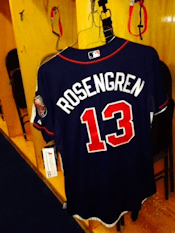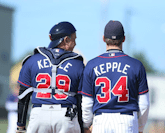
Photo by Tom Knickelbine
Genesis: In the big inning
“I want to pitch from that mound,” my buddy Tom Knickelbine said. He pointed to where Glen Perkins stood at Target Field. “Guys who attend fantasy camp get to play a game here next summer.”
“You’re going to fantasy camp?”
“Yeah.” TK had pitched in high school, taken 30 years off to go to college, finish med school, get married and have three children, but resumed his career last summer on our 35-over baseball team. “You should come, too.”
Sounded fun, but I knew my wife would never go for me leaving her alone with our two kids for a week. And I couldn’t justify writing a check for $4,195. Besides, much as I loved the game, I didn’t want to become some Walter Mitty parody. “Nah.”
I thought that was it until a couple of months later when TK sent an email telling me he’d registered and told the camp director about his writer friend. “Call him.”
I did. The director invited me as his guest. Then my wife surprised me–she agreed to the idea. So on a January morning with temps registering ten below in Minneapolis, I boarded the plane bound for fantasy camp.
#
Enter at your own risk
The sign on the door at the Player Development Complex read: “RESTRICTED AREA: Staff, players, and coaches only!!!!” Like every other one of the 132 campers there (including four women), TK and I had not gained access with our talents but could now enter the previously forbidden sphere. We opened the door and walked into the clubhouse.
My locker was larger than any I’d ever had: a wooden cubicle three-feet wide with a nameplate above it, a metal folding chair tucked inside, and two Twins jerseys–home and away–the blue one with my name across the back and the number 13. I had been too self-conscious to pick the number of my boyhood hero, Rod Carew, so I had chosen that of John Roseboro, a fellow catcher who had played two seasons with the Twins and was the subject of my latest book. There was also a Louisville Slugger with my name engraved on it.
Photo by Tom Knickelbine |
The camp format had us divided into ten teams, each coached by a pair of pros. TK and I played for Greg Gagne, shortstop on the Twins’ two World champion teams, and Frank Viola, the ace of the ’87 team. I had met Viola at the camp dinner the night before. He’s a big guy, 6’4” and heavier than the 200 pounds he played at—all of these pros are bigger in real life than they appeared on television and the field. Despite the diamond-studded No. 16 hanging from a thin gold chain around his neck, Viola in a hoodie with his red curly mop, thick mustache and New York accent seemed more a happy-go-lucky galumph than a three-time All Star and the 1988 Cy Young Award winner. “Good to meet you,” Sweet Music said, like it had been on his bucket list. “I hope you have some fun.”
Still, my first at bat, I felt the nerves. I wanted to prove I wasn’t a total imposter in my Twins uniform. The guy on the mound was throwing about the speed of the pitchers I had faced in my summer league since resuscitating my high school baseball career two years ago, but I have never been confident about my hitting. It didn’t calm me to hear Viola yell from the first base coaches’ box, “Okay, John, make a good debut.”
I flied out to right center. But at least I didn’t embarrass myself during the game—beyond bouncing a throw past the third baseman when starting the ball around the horn following a strikeout. I blocked plenty of balls in the dirt, though when I told Viola I was frustrated I’d gone oh-for-four, he ribbed me, “Hey, it can’t get any worse.”
#
All in the family
The majority of the campers came from Minnesota, this being a Twins camp after all and held in Florida during January, but others drifted in from as far away as San Francisco and Montreal. Doctors, attorneys, math teachers, software developers, mechanics, engineers, cops, even a Catholic priest looking to indulge their baseball jones by playing games and mingling with former pros. Many of them had been there before, multiple times. The ages spread from Curt Sampson, just the other side of 80, to his 20-year-old grandson. (The elder Sampson actually pitched a complete game victory, allowing only one run.) Campers needed to be at least 30 years old unless they signed up with a family member. There were 14 pairs of fathers-sons, two pairs of father-daughters. There was the multigenerational Sampson clan, Jim Duval with his four sons, and Mark Hodge with his three boys. Mark had been coming to camp for five years; this year he paid the freight for Chris, 37; Rob, 36; and Jake, 27. The trip, centered around their father’s love of baseball, replaced their past fishing excursions. “Here we all get to be twelve years old again together,” Mark said.
Frequently, the fathers formed battery combinations with their kids, reviving games of catch they’d played in the back yard. Lloyd Pallansch, whom everyone called “Papa Smurf” because of his resemblance to the bearded character, dropped the first three pitches his son threw. “I realized I was watching his face, to see how much he was enjoying himself, instead of the ball,” Papa Smurf said.
|
|
Just as I fell in the median age-wise, so too did I talent-wise as a weak-hitting, soft-armed catcher who could stop a low pitch, called a good game and could outsprint most other 49-year-olds. The talent ranged among the other campers from guys who had played college ball to one man who didn’t register a hit all week. There are no scouts at fantasy camp, but we were keeping score, and I wanted to play my best, or maybe even a little better. I identified with one guy who told me, “I don’t come here with any illusions about my skills. I know my limitations. But I find myself wanting to play just a little better than I can, and when I don’t that frustrates me.”
#
The beginning of a beautiful friendship
Every camp has its character; ours had two: Bert Blyleven and Derrick Doescher.
Blyleven, a Hall of Famer as renowned for his practical jokes as his curveball who currently puts the color into Twins’ television broadcasts, served as judge of the Kangaroo Court. “The rules of the court are that there are no rules,” he said.
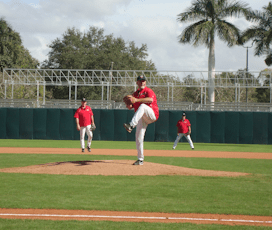 Photo by John Rosengren |
Doescher, a 27-year-old grease monkey from Mankato, sported the only Mohawk in camp, which sprouted five inches high. He animated the field with his loud proclamations of “GREAAAAAAT pupils!” and the like.
One night in the bar, he suddenly blurted, “Hey, I’m drinking with the wrong hand.” He claimed he had ordered beer only to ice the palm of his catching hand. Apparently he had taken so much treatment he’d forgotten the procedure.
The honorary Blyleven, presiding in a mop wig and black robes, seized upon Derrick’s unorthodox locks in the court’s first session. He fined him $14, one dollar for each spike he counted. “But how could you count that high?” Derrick retorted. “You didn’t take off your shoes.”
The two became fast buddies. They traded wisecracks, and Blyleven chauffeured Derrick in his Hummer from the field to the hotel. At the end of the week, in the court’s second session, Blyleven wore a faux Mohawk himself with his robes. “The court recognized the other night that we are a new generation, and we have decided to come down to your level,” he proclaimed.
#
Funny thing happened on the way to the ballpark
Humor spiced the camp. TK had some control issues his first game and plunked all three Hodge boys. “The only one of us you didn’t get was our old man,” one son said. So Mark Hodge approached TK in the clubhouse afterward, handed him a ball, took several steps back, flinched and said, “Okay, I’m ready.”
My teammate Chris Shinkle came back to the dugout after grounding out to the shortstop. “I want my money back,” he said. “My fantasy was to put it in those trees.”
On the day after the Hall of Fame vote, a camper asked a panel of the pros if they thought Pete Rose should be inducted. “Well,” former Twins outfielder Mickey Hatcher said with mock disgust, “he did give me a bad tip on a horse that finished last . . .”
After one of his players lined a base hit to right field, Juan Berenguer, former Twins pitcher turned first base coach, called to the right fielder, “Hey, that’s his first fantasy camp hit. Can I have the ball to give him?” When the fielder tossed Berenguer the ball, the coach sent his batter to second base.
#
Everybody loves a bargain
There was an easy rapport between the former pros and current campers, facilitated by the humor and time spent together in the clubhouse, on the fields and at meals. One morning, I sat down for breakfast with Berenguer, notorious for intimidating batters by scowling and throwing inside. Señor Smoke proved a nice guy, smiling benignly and telling me the story of being in Managua as a 17-year-old for a baseball tournament with the Panamanian national team in late December 1972. “Twenty minutes after our plane took off, they told us an earthquake had flattened our hotel,” he said. Roberto Clemente died on his way to aid victims of that earthquake. “My mother used to tell me life could change just like that.”
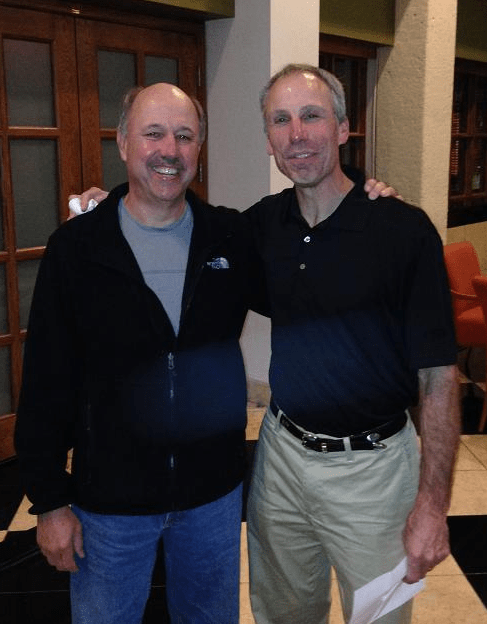 Photo by Ben Kepple |
At lunch one day, Tony Oliva, the great left-handed hitter whose knock-kneed stance after several knee injuries I remembered vividly, told me the story of coming to the United States as a teenage prospect from Cuba without knowing a word of English. “Someone wrote on a piece of paper for me ‘ham and eggs’ and ‘fried chicken,’” he said. “That’s all I ate for months.”
I ran into Gagne toting a shopping bag in the hotel stairwell. He had saved 30 percent on the shirts and pants he bought by signing up for one of the store’s credit cards. “I saved $130,” he said happily. Hearing this from a guy who made over $20 million playing professional baseball, I realized we were more alike than different—he just had a much better arm, which provided a different career path.
#
Excuse me, aren’t you . . .
But I was still apprehensive about approaching my boyhood hero when Rod Carew showed up in our dugout. Here was the Twins’ seven-time batting champion whose unusual stance we all used to imitate, now standing five feet from me. Do I tell him I’m a writer? No, that might put him on the defensive; he never liked the press. Do I say, “I used to pretend I was you?” No, that might creep him out. So I just waited and tried not to stare like an idiot.
Serendipitously, he asked, “What’s the score?”
“Three to one, us,” I said. “See that woman playing second? She was up with the score tied 1-1, bases loaded, two outs, two strikes, and she blooped a single to right—much like Rod Carew would have done.”
He smiled. This was going well.
“Drove in two runs. When the next batter asked for some Quick Dry to be spread in the batter’s box where the dirt was mushy, she told Viola coaching first, ‘That’s where I shit my pants.’”
That cracked up Carew. I survived that critical first impression.
#
Everyday hero
They say you shouldn’t meet your heroes. Few men can measure up to the illusions we’ve created of them, but Carew withstood the test.
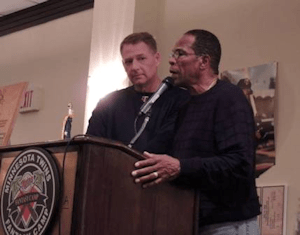 Photo by Al Schuth |
At dinner I had the chance to chat casually with him, asking if it was true he used to practice his bunting by laying down a towel as a target during BP (“Yes, a face towel.”), about learning to steal home (“Billy Martin knew we would have some close games and wanted me to be able to do that to help win them.”) and whether he was safe an eighth time in 1969, which would have broken Ty Cobb’s record for most times stealing home in a single season (“Yes, the catcher dropped the ball between his legs, but the ump stumbled and wasn’t in position to see it.”)
Finally, I asked him if it was weird having middle-aged men wearing jerseys with his number. “When I see them smile, the way their faces light up, I feel good that I can do that for him,” he said thoughtfully. “Isn’t that what it’s all about, being able to spread joy?”
After dinner Carew presented Mark Haigh, a camper with leukemia in remission, an autographed jersey. Carew lost his youngest daughter to leukemia in 1996 when she was only 18. That inspired his cause to raise awareness and money for cancer research, which has given guys like Mark Haigh a far better chance of survival. The two had met the day before, when Haigh waited in the corner for the long line of guys wanting Carew’s autograph to clear then told Carew his story. The father who had buried his daughter spoke to the younger man with compassion and encouragement. “When I walked out of there with tears in my eyes, I realized that Rod Carew the baseball player had been my childhood hero,” Mark told us. “I found out yesterday Rod Carew the man is my real life hero.”
#
Just rub some dirt on it
The injuries mounted as the week wore on. None of us was used to playing two seven-inning games daily. One guy had to fly home early for emergency surgery on his biceps tendon. Mark Hodge’s oldest son Chris hobbled around on crutches after messing up his knee. Bill Clabots, a restaurant owner in the Twin Cities, showed me in the bar one evening where six foul tips had struck him, all avoiding his equipment. His wife Connie had shown up only to find Bill sprawled on the ground after a ball caught him in the throat. She sat down in the bleachers. “Weren’t you worried?” I asked.
“No,” she replied. “Bill’s been beaten up a lot playing ball. That’s his thing.”
#
What would Bert do?
The line lengthened daily in the training room, where three trainers rubbed, stretched and applied ice packs. A massage therapist worked overtime. Ibuprofen and beer became the PEDs of choice.
My throwing shoulder ached a bit (probably from rifling a throw into center field on a play at second base), but my knees and legs had borne the strain of catching and running without complaint. TK wasn’t so lucky.
He already wore a brace after corrective surgery on his left knee, but in his first game pitching he tweaked the medial meniscus of his right knee. He further aggravated it in the second game he pitched, a one-run gem. “It’s fun watching the two of you work together,” Viola told us afterward, which we both appreciated.
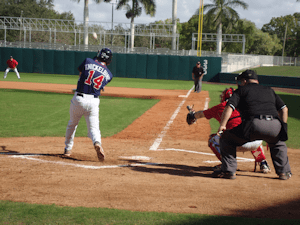 Photo by John Rosengren |
Friday morning, we had our first playoff game. Win and we played a final game for fifth place. Lose and we were done. TK was our squad’s best pitcher, but Viola decided to play it safe, starting another guy who had pitched a win and hoping TK’s aching knee would allow him to pitch the next day. But after our starter struggled through three innings and we trailed 4-0, TK realized this could be his last chance to pitch at camp. In a gutsy performance, he threw three solid innings, giving up only one unearned run. However, we failed to score any runs ourselves. So our season ended, but not before TK threw a Blylevenesque curve in the final inning that buckled the batter’s knees. I saw him smile despite his throbbing knee.
#
Reality bites
My best play had come early in the week, before I realized that would be my only highlight moment. I chased a high foul pop down the third base line. The ball seemed within my range, but the wind swatted it around. I managed to snag the ball across my body in front of the opposing dugout. The next day in the clubhouse, Lee Stange, former Twins pitcher who had been coaching the other team, teased me about being too old to play catcher, but then complimented me on my catch. I tucked that into my bag of souvenirs.
Throughout the week, I managed a couple of walks, a base hit that drove in two runs and, during the pro-rookie game, a single off Rick Aguilera, closer for the ’91 Twins who grooved me a meatball, but ultimately I felt discouraged by my hitting—or lack of it. I had struck out twice looking and tapped several soft balls up the middle. Getting on base because of errors or outrunning a possible doubleplay ball offered no consolation. Reality trumped my fantasy.
#
Look at how the fish live
The pros kept telling me they were having fun. I’ve digested a lot of clichés from athletes but this one seemed sincere. They had the chance to reconnect with old teammates. They joked with the campers. They told stories about the glory days, reliving their past, which allowed them to become ballplayers once again, even if it was only in their memories. “It’s fun for us, seeing you guys, some who haven’t played for 25-30 years, having fun playing baseball,” Viola said. “You get to see how we lived.”
That’s probably the biggest boon for campers: fantasy camp conjures dreams of the future they never had. They get to live the life of a pro ballplayer, playing games, rehashing them, hanging in the clubhouse. They get to meet boyhood heroes, kick back with former pros, hear entertaining stories. It’s expensive, costing thousands of dollars and, in some cases, physical injury. And, of course, it exposes the folly of our dreams, sending us home with the realization that we are has-beens who never were.
#
Say goodbye to Mr. Roarke
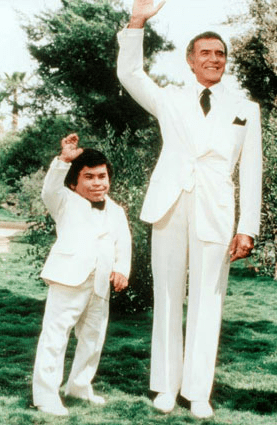 |
Sunday morning we dispersed. On the flight headed back to Minneapolis, I spotted John Duvall, whom I’d played against in our last game and sat next to at dinner the last night. “Hey, aren’t you that ballplayer?”
“No.”
“I guess that’s one question the camp answered,” I said.
With our uniforms tucked into our suitcases, he was once again a financial advisor, I a writer and TK a cardiologist. But we also toted the memories of an extraordinary week. I realized Viola was right. He had told us before our last game it wouldn’t matter whether we won or lost, what we took home would be the experience. I had missed that, taking myself too seriously, but now I understood.
Plus, we still had that reunion game at Target Field to play. That would be fun.
John Rosengren is the author of The Fight of their Lives: How Juan Marichal and John Roseboro Turned Baseball’s Ugliest Brawl into a Story of Forgiveness and Redemption
© John Rosengren 2014
